Claire Danes Me and Orson Welles Interview
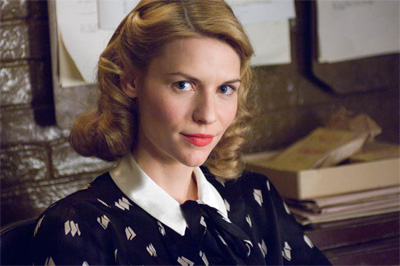
ME, ORSON WELLES AND CLAIRE DANES
EXCLUSIVE Claire Danes, Me and Orson Welles Interview by Paul FischerClaire Danes was considered something of an It girl as her stardom was propelled from such an early age. A native New Yorker, Claire Danes was born April 12, 1979, and raised in then up-and-coming SoHo by artistic parents. She was learning modern dance at six, and at age nine, began taking acting classes at the Lee Strasberg Theatre Institute. Her career began in off-off-Broadway productions "Happiness," "Punk Ballet" and "Kids on Stage," for which she choreographed a solo dance piece. Claire Danes attended the prestigious Dalton School and went on to the Professional Performing Arts School during junior high. While there, she truly became a professional by making her television debut on "Law & Order" (NBC, 1990- ), portraying a volatile teen involved with a sleazy photographer. The same year, with only one TV credit to her name, Claire Danes auditioned for "My So-Called Life" and was chosen over a large pool of actresses to play the lead character of 15-year-old Angela Chase, suburban teenager. ABC delayed their commitment to the show, and it was not until the following year that ABC followed up its pilot with additional episodes. Claire Danes made the inevitable move to Los Angeles. When the show debuted in the fall of 1994, it joined a television lineup virtually devoid of teen-targeted programming.
Despite the network's uncertainty on how to promote the show and their reluctance to understand the potential audience, word-of-mouth brought in devotees who connected to the honest depiction of teen life as one filled with difficult, day-to-day challenges. Just as popular was the portrayal of Angela Chase as a realistic teen, full of doubt and anxiety and searching for an identity. The show earned a cult following and an avalanche of critical kudos, but ABC hoped for larger numbers and a wider demographic. That, coupled with Dane's already waning interest in the grueling TV shooting schedule, led to the show's cancellation after only 19 episodes.
When "My So-Called Life" ended, Claire Danes stayed in Los Angeles and attended the Lycee Francais, while at the same time, fielded offers for feature film work. She won strong notices for her movie debut alongside Susan Sarandon and Winona Ryder as the doomed sister Beth in Gillian Armstrong's well-received adaptation of Louisa May Alcott's "Little Women" (1994). Claire Danes had a small role as a younger version of Anne Bancroft's character in another female ensemble, "How to Make an American Quilt" (1995), and followed up with a small role as the wise-beyond-her-years daughter of Holly Hunter (and granddaughter of Bancroft) in Jodie Foster's "Home for the Holidays" (1995). Foster's endorsement helped Claire Danes win the plum role of Juliet opposite Leonardo DiCaprio in Baz Luhrman's "William Shakespeare's Romeo + Juliet" (1996), a highly stylized and purposefully anachronistic retelling of the classic story. Claire Danes' continued popularity with young audiences was evidenced in her slew of MTV Movie Award nominations, while critics also recognized her performance.
From that hot blockbuster Claire Danes moved on to independent film, playing a teen neglected by her grieving father (Peter Gallagher) in "To Gillian on Her 37th Birthday" (1996) and starred opposite Jude Law in the coming of age romantic drama "I Love You, I Love You Not" (1997). Oliver Stone cast her as a white trash princess in his "U-Turn" (1997), while the same year, Francis Ford Coppola tapped her to play an abused wife who falls for young lawyer Matt Damon in "John Grisham's 'The Rainmaker'" (1997). After voicing the English language version of Hayao Miyazaki's acclaimed Japanese anime "Princess Mononoke" (1997), Claire Danes continued to show a fondness for character-driven drama, playing Cosette in Bille August's adaptation of "Les Miserables" (1998) and starring as an unmarried and pregnant Polish-American in the indie family saga "Polish Wedding" later that year.
Claire Danes was accepted to Yale University in 1998, and spent two years there working towards a psychology major while continuing to shoot films during her off time. The maturing actress also began to branch out onscreen, surprising audiences with her role as drug offender-turned-crime fighter in Scott Silver's big screen update of the 1960s TV series, "The Mod Squad." She followed up with the harrowing "Brokedown Palace" (1999) co-starring with Kate Beckinsale as teens duped into importing drugs into Thailand. In 2001, Claire Danes left Yale in favor of full commitment to acting, returning to screens in the coming-of-age indie comedy "Igby Goes Down" (2002) as a prep school girl caught between two drastically different brothers. The same year, Stephen Daldry tapped Claire Danes for his critically acclaimed adaptation of "The Hours" (2002), based on the novel about several generations of women whose lives are interconnected through the Virginia Woolf novel, Mrs. Dalloway.
The 2003 sci-fi drama "It's All About Love," which teamed Claire Danes romantically with Joaquin Phoenix, was a critical and box office disappointment and Claire Danes followed up with another surprising choice in the action-packed sequel, "Terminator 3: The Rise of the Machines" (2003) followed by"Stage Beauty" (2004), in which she played a 17th Century actress entangled with fellow actor Billy Crudup. Next she was paired onscreen with a successful sophisticate (Steve Martin) and a Bohemian dreamer (Jason Schwartzman) in the adaptation of Steve Martin's bestselling novella, "Shopgirl" (2005) and followed up that critical success with the popular holiday ensemble comedy "The Family Stone" (2005). She then appeared in the adaptation of Susan Minot's "Evening" (2007).
The year 2007 also marked Claire Danes Broadway debut, appearing as Eliza Doolittle in a revival of "Pygmalion." Although her co-starring role alongside Richard Gere in the crime thriller "The Flock" (2007) did not make it to theaters, Dane experienced considerable success with the adaptation of Neil Gaiman's fantasy film, "Stardust" (2007). After a long absence from the small screen, Claire Danes will next be seen in "Temple Grandin" for HBO starring in the true story of an autistic woman who became a pioneer in the cattle industry. In her latest movie she portrays an aspiring actress as well as assistant to the legendary Orson Welles in "Me and Orson Welles", a fictionalized account of the director's early years, directed by Richard Linklater. The beautiful actress talked to Paul Fischer in this exclusive interview.
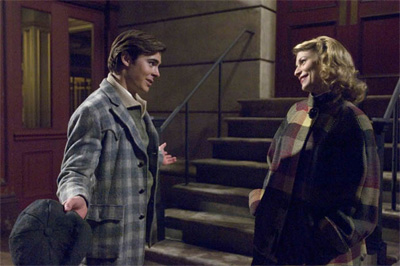
Claire Danes Me and Orson Welles Interview
QUESTION: What was the attraction of this character in Me and Orson Welles for you?CLAIRE DANES: Well, the script was great and it's really rare to find a script that's as witty and clever and engaging, and where all the characters were very vivid, and imaginative, so, that was incredibly appealing in and of itself. And then, of course, I knew that Richard Linklater was directing it, and he's one of my favorite directors. And then it had managed to attract an incredible cast. I was one of the last people to be cast. So, there was really nothing about this project that didn't make me very excited.
QUESTION: Had you read the book that it was based on?
CLAIRE DANES: I read it when I immediately accepted the offer to do the movie, but, I think the book is incredibly winning.
QUESTION: Now, how necessary is it for you to do research on this particular period? Or is it simply already there on the page?
CLAIRE DANES: I mean, the vast majority of it was on the page. But Rick had done a lot of our homework for us, and gave us a packet of references of the time. So, he gave us mixed CDs of music from the era, and slang from the era, and photographs of the theatre, the original Mercury Theatre, and the actors who performed in the original production of Julius Caesar. So, you know, he created a really detailed portrait of that time for us.
QUESTION: Would you say that Linklater is an actor's director?
CLAIRE DANES: Very much so, yeah. He's a dream to work with, you know? He's very clear about what he wants, and he can communicate his vision really easily. But at the same time, he's very permissive, you know? And gives the actors a lot of freedom to explore, and play, and goof off, and create something kind of surprising and genuine.
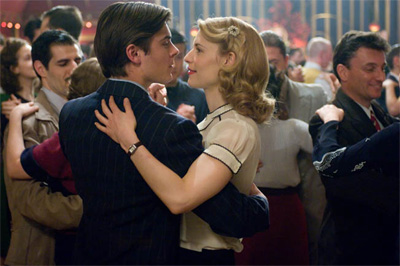 QUESTION: You've had this really fascinating career, that began with kind of adolescence, and then kind of segued into young adulthood. And there was a point where you were kind of defined as The It Girl, and then you kind of went off and decided to do a lot of non-mainstream projects. Was that by design? Because you've made your mark, it seems to me, in film - even though, you know, everyone knows you from a lot of mainstream films. It's certainly the indie world that you seem to be attracted to.
QUESTION: You've had this really fascinating career, that began with kind of adolescence, and then kind of segued into young adulthood. And there was a point where you were kind of defined as The It Girl, and then you kind of went off and decided to do a lot of non-mainstream projects. Was that by design? Because you've made your mark, it seems to me, in film - even though, you know, everyone knows you from a lot of mainstream films. It's certainly the indie world that you seem to be attracted to.CLAIRE DANES: Well, yeah. I mean, I didn't have any grand designs and really did just find myself gravitating to one story or another, some of them probably were on a smaller scale than maybe they should have been. And I put that in quotes, you know? But - yeah. I mean, I'm always just attracted to characters who are dynamic and have an opportunity to undergo some pivotal change, you know?
QUESTION: The older you get, are those kind of women harder to find, for you?
CLAIRE DANES: You know what? I think it's a difficult time right now in a lot of industries, because of the economy, and that's certainly true of ours as well. They're making fewer movies than they ever have, therefore there are fewer roles, so I think everybody's experiencing that pinch. But I mean, I've been very fortunate so far, and I have yet to reach the age where I'm suddenly forced into maternal roles, or something.
QUESTION: Well, do you ever look back and ask yourself - was there, in your mind, ever a disadvantage in starting out so young in the public eye? Do you think that was - if you could do it all over again, would you make the same choices, from such a young age?
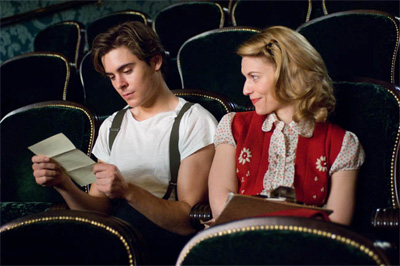 CLAIRE DANES: I'm really happy right now, in my life. I stopped acting for three years, and I went to college, which was the right thing for me to do. I think I probably did sacrifice a lot by working so young, but I made up for it later. I mean, there were parts of me that were really overdeveloped, and other parts that were kind of underdeveloped and I did balance out during that time at school. I kind of just hung out, and learned how to socialize, made friends outside of the industry, and I kind of defined myself as a person, in a safe place, so I feel quite fortified now. But I'm also so grateful for the experiences that I had as a young person, telling these great stories, with these brilliant, imaginative people and it was incredibly edifying.
CLAIRE DANES: I'm really happy right now, in my life. I stopped acting for three years, and I went to college, which was the right thing for me to do. I think I probably did sacrifice a lot by working so young, but I made up for it later. I mean, there were parts of me that were really overdeveloped, and other parts that were kind of underdeveloped and I did balance out during that time at school. I kind of just hung out, and learned how to socialize, made friends outside of the industry, and I kind of defined myself as a person, in a safe place, so I feel quite fortified now. But I'm also so grateful for the experiences that I had as a young person, telling these great stories, with these brilliant, imaginative people and it was incredibly edifying. QUESTION: When you look back, and you see footage of yourself in Romeo and Juliet, or any of these other young roles, do you look at them as being almost like home movies, in a way? Are you enough detached from that period of your life to see the kind of actor you were when you were 13, 14 years old?
CLAIRE DANES: I mean, I never watch my movies; I get too squeamish. But I'm kind of saving them for my kids, or something. I mean, they probably won't be remotely interested. Really, who am I kidding?
QUESTION: Why did the acting bug hit you in the first place?
CLAIRE DANES: I don't know. I started dancing when I was very young and that's how I found acting, initially. But I can't say. I just knew. I was absolutely certain at a very young age that this was what I wanted to pursue. I think I'm a natural ham, I'm pretty perceptive, and I really like thinking seriously about how we operate.
QUESTION: And after college, was it easy for you to regain the passion that you had for acting?
CLAIRE DANES: Yeah. I mean, I'd been acting for so long, I didn't know if I was doing it out of habit, or true passion. And sure enough, I learned that it was the latter rather than the former. But I wanted to give myself a chance to explore different avenues, and different interests and I'm really glad I did, because I don't feel remotely resentful. It's something I chose. I wasn't bullied into it.
QUESTION: Tell me about this HBO movie that you finished. Are you shooting something else, or did you finish that?
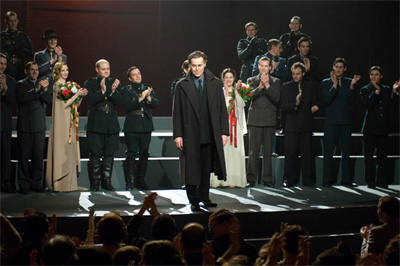 CLAIRE DANES: Well, it comes out in February. I finished it the end of last year. It's about a woman called Temple Grandin, who is extraordinary. She's autistic, and she's the first person to have written about autism, somebody who has it. And she also went on to revolutionize the slaughter industry. She created a humane way to kill cattle. So, she's a brilliant autistic cowgirl, basically.
CLAIRE DANES: Well, it comes out in February. I finished it the end of last year. It's about a woman called Temple Grandin, who is extraordinary. She's autistic, and she's the first person to have written about autism, somebody who has it. And she also went on to revolutionize the slaughter industry. She created a humane way to kill cattle. So, she's a brilliant autistic cowgirl, basically.QUESTION: I presume you immersed yourself in the research for that one.
CLAIRE DANES: Yeah. There was quite a bit of research to do there, but it was all fascinating.
QUESTION: Anything else that you're looking at, at the moment, or that you're working on?
CLAIRE DANES: No. I don't know what's next. I'll just have to remain patient.
QUESTION: Will you direct, do you think?
CLAIRE DANES: No. [LAUGHTER]
QUESTION: Really? Wow, that's emphatic.
CLAIRE DANES: They have way too much work, way too many responsibilities, as directors.
QUESTION: What about other creative aspects of the arts, like writing?
CLAIRE DANES: You know, I don't know. I mean, it was really refreshing to return to dance, and it is kind of exciting to indulge my other creative urges. I like to draw a lot. I imagine I would do something with visual art, before I would direct.
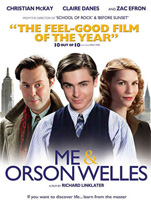
Me and Orson Welles
Starring: Zac Efron, Christian McKay, Claire DanesDirector: Richard Linklater
Genre: Dramas
ME AND ORSON WELLES, Richard Linklater's new coming of age feature set in 1937 stars Disney teen throb Zac Efron, star of High School Musical, who stretches himself as an actor playing the young aspiring actor Richard who lands a job with Orson Welles (played by newcomer Christian McKay) and his legendary Mercury Theatre Company.
The whirlwind experience of working with the boy genius and appearing in Welles' soon-to-be groundbreaking production of Julius Caesar as Lucillus sets his life on a new course. In that same week, he also finds romance with older woman Sonja (Claire Danes). Experiencing romance and immersed into a creative process few are afforded, Richard also learns a few lessons about crossing swords with the imperious and brilliant Welles. He must grow up fast.
MORE
- Mission: Impossible Fallout
- Glenn Close The Wife
- Allison Chhorn Stanley's Mouth Interview
- Benicio Del Toro Sicario: Day of the Soldado
- Dame Judi Dench Tea With The Dames
- Sandra Bullock Ocean's 8
- Chris Pratt Jurassic World: Fallen Kingdom
- Claudia Sangiorgi Dalimore and Michelle Grace...
- Rachel McAdams Disobedience Interview
- Sebastián Lelio and Alessandro Nivola...
- Perri Cummings Trench Interview
Copyright © 2001 - Female.com.au, a Trillion.com Company - All rights reserved. 6-8 East Concourse, Beaumaris, Vic 3193, Australia.



